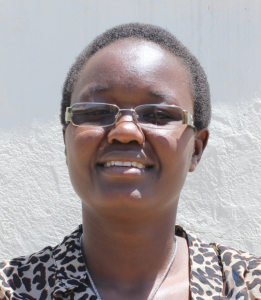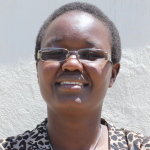The 402 students and 14 staff of Gavudunyi Friends Model Primary School desperately need a clean water supply to meet their daily needs.
Lince C., a female student, expressed how she is overwhelmed by not having access to clean, safe water to drink at her school. "Water is life, but to me, that word has lost meaning because my life is upside down as a pupil. Water has made me sick, miss classes, and feel tired all the time. I hope and pray that one day this nightmare will be over, and my life and education will be enjoyable."
There is a rainwater tank on the school campus, but even when it fills, it is not sufficient to meet the water demand of the school because its capacity is too small. The tank runs dry quickly because of the high consumption rate, leaving students to choose either to carry water from home or trek to a faraway spring that is hard to access.
Pupils most often carry water from home every morning and again after lunchtime. Sometimes they are also told to fetch water again during class hours when the school does not have enough water for handwashing, drinking, cleaning classrooms, and cooking. Sadly, pupils spend more time fetching and carrying water than being in class, leaving them exhausted and unable to concentrate, contributing to their poor academic performance.
The collected water is often contaminated, so pupils and teachers both complain of stomach pains and diarrhea, and most of them have been diagnosed with typhoid at some point.
Head Teacher Mr. Henry Siahi commented, "Lack of water in school is bad, and as a teacher and a parent, it's hard for me to run the school that has no water. I personally get sick because of the water that is brought from different sources back home by the pupils. I have no choice but to use the water because we need it."
A borehole will serve the school sufficient clean, safe water so pupils will no longer need to carry water from home and can concentrate on their studies.
What We Can Do:
New Well
We conducted a hydrogeological survey at this school and the results indicated the water table beneath it is an ideal candidate for a borehole well. Due to a borehole well's unique ability to tap into a safe, year-round water column, it will be poised to serve all of the water needs for this school's large population, even through the dry months.
The school will help collect the needed construction materials such as sand, rocks, and water for mixing cement. They will also provide housing and meals for the work team, in addition to providing local laborers. We will complement their materials by providing an expert team of artisans and drilling professionals, tools, hardware, and the hand-pump. Once finished, water from the well will then be used by the school's students and staff for drinking, handwashing, cooking, cleaning, and much more.
Handwashing Stations
There is currently nowhere for students to wash their hands after using the latrines or before eating lunch, let alone the water to do so.
The student health club will oversee the two new handwashing stations we will provide, and make sure they are kept clean and in working condition. The club leaders will fill the handwashing stations with water daily and make sure they are always supplied with a cleaning agent such as soap or ash.
VIP Latrines
We will construct two triple-door latrine blocks using local materials that the school will help gather. Three doors will serve the girls and three doors will serve the boys. All of these new latrines will have cement floors that are designed to be easy to use and to clean. And with a borehole right on school property, there should be enough water to keep them clean.
Training on Health, Hygiene, COVID-19, and More
We will hold a one-day intensive training session with students, teachers, and parents. This training will cover a wide range of topics including COVID-19 symptoms, transmission routes, and prevention; personal and environmental hygiene; and the operation and maintenance of the borehole, latrines, and handwashing stations. There will be a special emphasis on handwashing.
Our team of facilitators will use a variety of methods to train, including participatory hygiene and sanitation transformation, and asset-based community development. We will initiate a student health club, which will prepare students to lead other pupils into healthy habits at school and at home. We will also lead lectures, group discussions, and provide illustrative handouts to teach health topics and ways to promote good hygiene practices within the school including handwashing and water treatment. We will then conduct a series of follow-up trainings before transitioning to our regularly scheduled support visits throughout the year.
We and the school strongly believe that all of these components will work together to improve standards at this school, which will help lead to better student academic performance and will help unlock the opportunity for these students to live better, healthier lives.

 Borehole Well and Hand Pump
Borehole Well and Hand Pump
 Rehabilitation Project
Rehabilitation Project








































